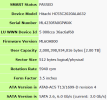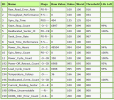Luke
Well-Knwοn Мember
Rather than clutter a recent similar discussion concerning Seagate HDDs this thread concerns the SMART data for a Hitachi HDD that I've just installed in an HDR-FOX T2.
The 2TB Hitachi HDD was sourced from a Sky recorder.
EDITED
The main question has been removed from this post as the thread immediately turned into a thread about the wording of the add on question.
A separate thread has been started for just the main question.
Also is the Power_On_Hours suspect? The Life Left interpretation is 94% but if this were a 2TB Seagate I'd expect the Life Left for 48504 to be 47% which is very different from the 94% for this Hitachi


The 2TB Hitachi HDD was sourced from a Sky recorder.
EDITED
The main question has been removed from this post as the thread immediately turned into a thread about the wording of the add on question.
A separate thread has been started for just the main question.
Also is the Power_On_Hours suspect? The Life Left interpretation is 94% but if this were a 2TB Seagate I'd expect the Life Left for 48504 to be 47% which is very different from the 94% for this Hitachi


Last edited:

 ...so why the heck is that??? There's no difference in the version of smartctl.
...so why the heck is that??? There's no difference in the version of smartctl.